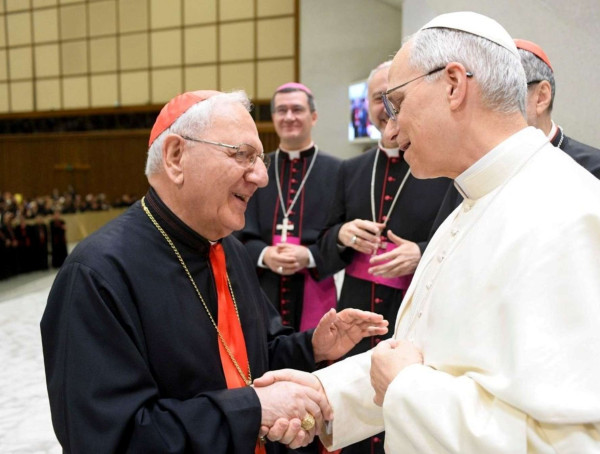
The Chaldean Patriarch of Babylon Cardinal Sako met Pope Leo XIV during his audience with Eastern Catholics on 14 May.
Ishtartv.com - asianews.it
by Dario Salvi, 05/21/2025
In an interview with AsiaNews,
Cardinal Louis Raphael Sako reflects on the days of the Conclave spent
alongside the new pontiff and their “very important” first meeting after the
election. He describes the “complicated situation” facing Christians in the
Middle East, who suffer from a “lack of stability” despite some improvements in
security. His first words to Pope Prevost: “We are counting on you.”
The Churches of the Middle East
“are facing a very complicated situation,” stemming primarily from a “lack of
stability”, even if “security has improved.” The overall context, however,
“remains difficult and full of challenges.
That is why the support” of Pope
Leo XIV is crucial—vital, in fact, “to prevent the disappearance of Christians
from the region.” So says Cardinal Louis Raphael Sako, Chaldean Patriarch of
Baghdad, speaking to AsiaNews in Rome following the Conclave and the
new pope’s first jubilee audience, which was directed at the faithful of the
Eastern Churches.
“The meeting between the Pope and
the Eastern Churches,” the cardinal noted, “was a significant and special
moment, because we are not always present [in Rome], whereas on this occasion,
we were here for the Jubilee and the inauguration.”
Migration, synodality, and
interreligious dialogue are the main issues facing the Churches of the Middle
East in this historic period marked by recent violence—from ISIS to the wars in
Syria and the Holy Land—and by profound, rapid change.
Maintaining a Christian presence
in the region remains a top priority, particularly in Iraq, where the local
Christian community has plummeted from around 1.5 million to fewer than 300,000
in just 20 years. Many now serve as “missionaries” in their own land.
The experience of the General
Synod, which unites the Patriarch with his bishops, could offer a valuable
model for the work the pope will undertake with his cardinals. One key priority
is the relationship with other faiths—especially Islam—in a region where
Muslims form the majority, both native and migrant.
Recalling the days that led to the
election of Pope Leo XIV—especially the two-day Conclave that concluded on the
afternoon of 8 May with the fourth ballot—the Chaldean Patriarch said: “I
stayed by his side throughout the process. I told him how the Middle East is
going through a difficult and critical period, and how great the hope and trust
the faithful place in the Pope is. I said to him, ‘We are counting on you,’ at
a time,” he added, “when Christians are under threat.”
“Interreligious dialogue is just
as important. In this regard,” the cardinal noted, “Pope Francis launched
initiatives that have transformed relations—even within the Muslim world
itself.”
Dialogue, he warned, should not be
merely “theological, but a dialogue of life, of friendship, which is a very
important dimension for Islam.” This has been exemplified in visits to
Muslim-majority countries: Abu Dhabi for the signing of the Document on Human
Fraternity, Bahrain, Jordan, the Maghreb, and Iraq itself—where Cardinal Sako
witnessed the historic meeting in Najaf between Pope Francis and Grand
Ayatollah Ali al-Sistani.
Among the first topics addressed
by Pope Leo XIV was the question of the diaspora, which the Chaldean Patriarch
described as “very important,” especially for the Iraqi Church, which must
respond to the challenges posed by migration.
“The Pope said that the Catholic
Church needs the Eastern Churches. I would add that we, as Eastern Churches,
need the Catholic Church even more, because our political situation,” he
stressed, “is extremely complex.”
One of the first impressions the
Chaldean Primate formed of the new pope was his considered and measured style:
“He prepares his speeches. He doesn’t speak off the cuff or spontaneously—and
this was evident from his very first appearance” from the central loggia of St
Peter’s Basilica following his election.
As the pontificate is still in its
early stages, “it will take time” to develop a clear agenda and establish
priorities. For Cardinal Sako, one major task is to “reorganise the Curia,
which is very important. He will need to identify competent, authentic and
loyal collaborators.”
Among the requests the cardinal
has already made is the proposal to “meet occasionally with other Catholic
patriarchs to discuss our situation and face difficulties directly,” and to
find ways of “cutting through bureaucracy. We need short-term solutions,” he
warned, “because time is not on our side.”
Returning to Iraq, the cardinal
brings with him “greetings from Pope Francis, memories of the days of the
Conclave, and the election of the new pontiff—an event the Chaldean faithful
followed via the Patriarchate’s website.”
He also recalls the time spent
alongside the future pope, the Mass celebrated together with the Syro-Malabar,
Maronite and Byzantine communities, “which had a powerful impact.”
To this, he adds “the meeting with
the Eastern Patriarchs during the Jubilee, at which I delivered a very
important speech in the presence of more than 350 Chaldeans who had come on
pilgrimage from Iraq, the United States, Canada—all of whom were deeply joyful.”
“It was,” the cardinal concludes,
“an opportunity to show the face of the universal Church and its unity—a source
of encouragement and hope even in the midst of adversity.”
|